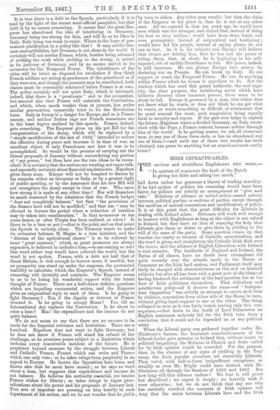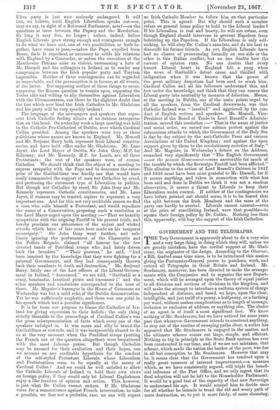IRISH IMPRACTICABLES.
THE envious and atrabilious Englishman who wrote,— " In matters of commerce the fault of the Dutch Is giving too little and asking too much," • laid down rather too generous a theory of trading morality. If he had spoken of politics his reasoning would have been fairer, for politics are strictly an arrangement of "give and take." Relations of alliance or united action cannot subsist between political parties, or sections of parties, except through the medium of mutual concessions and modifications of policy. It is at this point that the great difficulty for Liberals in dealing with Ireland arises. Irishmen will work well enough in harness with Englishmen as long as the object is one valued in Ireland, but they have no idea of repaying the help that Liberals give them or desire to give them by yielding to the will of the mass of the party. Some question comes up that touches the vanity or interest of Catholic sacerdotalism, and the word is given, and straightway the Catholic Irish kick over the traces, and the alliance of English Liberalism with Ireland is rent asunder. The landlords of England and Ireland, the Tories of all classes, have no doubt been triumphant till quite recently over the attacks made in the House of Commons on the Irish land system, and Parliament itself may fairly be charged with obstructiveness on this and on kindred subjects, but after all has been said, a great part of the blame of having hindered the settlement of the land question lies at the door of Irish politicians themselves. That ridiculous and mischievous policy—if it deserve the name—of "Indepen- dent Opposition" was strictly an attempt to extort, as it were by violence, concessions from either side of the House in turn, without giving loyal support to one or the other. The thing collapsed as soon as it, was fairly tested, leaving only this con- sequence,—that down to the death of Lord Palmerston no English statesman seriously bid for the Irish vote, from a conviction that it could not be depended on at any political crisis. '
When the Liberal party was gathered together under Mr. Gladstone's banner, the dominant conscientiousness of the Liberal leader gave promise to Ireland that, without resort to political bargaining, the Reforms in Church and State called for by Irish opinion would be conceded. For the present, then, in the absence of any signs of yielding in the Tory camp, the Irish popular members are staunchly Liberals. They voted, with half-a-dozen insignificant exceptions, as steadily as even Mr. Bright could have desired, with Mr. Gladstone all through the Sessions of 1866 and 1867. But how long will this alliance endure ? We fear it will prove but shortlived ; we regret it deeply ; we heartily wish it were otherwise ; but we do not think that any one who has carefully watched the currents of Irish opinion will deny that the union between Liberals here and the Irish Ultra party is just now seriously endangered. It will last, we believe, until English Liberalism speaks out—or, may we say, in sight of a Reformed Parliament, acts ?—on the questions at issue between the Papacy and the Revolution. So long it may live, no longer ; unless, indeed, before English Liberals grow strong enough and courageous enough to do what we have said, one of two possibilities, or both to- gether, have come to pass,—unless the Pope, expelled from Rome, finds it expedient or necessary to settle his relations with England by a Concordat, or unless the execution of the Manchester Fenians raise so violent, unreasoning a hate of Mr. Disraeli and his colleagues in Ireland as to render any compromise between the Irish popular party and Toryism impossible. Neither of these contingencies can be regarded as improbable, and the presumption is in favour, at all events, of the latter. But supposing neither of these things to occur, supposing the Roman question to remain open, supposing the Tories able and willing to ally themselves against Liberalism with the Ultramontanes, can there be the slightest doubt that the ties which now bind the Irish Catholics to Mr. Gladstone and his party will be very speedily broken ?
The language of the newspapers and speakers that repre- sent Irish Catholic feeling admits of no dubious interpreta- tion on this head. On yesterday week a large meeting was held in the Catholic Pro-Cathedral of Dublin, over which Cardinal Cullen presided. Among the speakers were two or three politicians whose names are known in England. Mr. Monsell and Mr. Serjeant Barry both represent Irish Liberal constitu- encies, and have held office under Mr. Gladstone. Mr. Lane Joynt, the Lord Mayor of Dublin, Sir John Gray, M.P. for Kilkenny, and Mr. Kennedy, M.P. for Louth, are all three Protestants ; the rest of the speakers were, of course, Catholics. We should think that the object of a meeting to express sympathy with the Pope and to denounce the enter- prise of the Garibaldians was hardly one that would have easily commanded the support of men not Catholics by creed, and professing the extremest type of Liberalism in politics. But though not Catholics by creed, Sir John Gray and Mr. Kennedy represent Catholic constituencies, and Mr. Lane Joynt, if rumour may be trusted, aspires to represent a very important one. And for this not very creditable reason we find a man who calls himself a Protestant, and would repudiate the name of a Conservative; proposing such a re4olution as the Lord Mayor urged upon the meeting :—" That we heartily sympathize with the reigning Pontiff in his present trials, and hereby proclaim our abhorrence of the unjust and wicked attacks which have of late years been made on his temporal sovereignty." Sir John Gray went further, and sub- limely ignoring the performances of the Chassepots and the Polhes Brigade, claimed "all honour for the few devoted bands of Pontifical troops who had lately driven back the invaders." "Their prowess," he said, "had been inspired by the knowledge that they were fighting for a paternal Government, and they had consequently thrown back their assailants to death and destruction." Mr. Seijeant Barry, lately one of the Law officers of the Liberal Govern- ment in Ireland, "denounced," we are told, "Garibaldi as a crazy, bombastic, fanatical pirate and buccaneer ;" and the other speakers and resolutions corresponded to the tone of these. Mr. Maguire's harangue in the House of Commons on Wednesday was but a mild echo of the Dublin demonstration. Yet he was sufficiently emphatic, and there was one point in his speech which had a peculiar significance.
It is far from our purpose to blame the Catholics of Ire- land for giving expression to their beliefs ; the only thing strictly blamable in the proceedings of Cardinal Cullen's was the gross misrepresentation of facts which every one of the speakers indulged in. It was mean and silly to brand the Garibaldians as cowards, and it was inexpressibly absurd to do so at the very moment when the Pontifical troops (putting the French out of the question altogether) were bespattered with the most fulsome praise. But though Catholics may be excused for their exultation and their hopes, can we account on any creditable hypothesis for the conduct of the self-styled Protestant Liberals, whose Liberalism and Protestantism seem to be equally at the mercy of Cardinal Cullen ? And we could be well satisfied to allow the Catholic Liberals of Ireland to hold their own views on foreign policy, if they would only let Liberal Englishmen enjoy a like freedom of opinion and action. This, however, is just what Dr. Cullen cannot endure. If Mr. Gladstone votes for a remonstrance against French intervention, to take a possible, we fear not a probable, case, no one will expect an Irish Catholic Member to follow him on that particolo.r point. This is agreed. Bat why should such a member refuse on general home policy to hold to the Liberal leader? If his Liberalism is real and hearty, he will not refuse, even though England should intervene to prevent Napoleon from bolstering up the Popedom. If his Liberalism is only self- seeking, he will obey Dr. Cullen's mandate, and do his best to discomfit his former friends. As yet, English Liberals have had no chance of pronouncing formally on one side or the other in this Italian conflict, but no one doubts how the current of opinion runs. No one doubts that every honest Liberal heart in England felt a pang when the news of Garibaldi's defeat came, and thrilled with indignation when it was known that the power of the great military despotism had been used to crush him. Cardinal Cullen and all his followers understand this, and fret under the knowledge, and think that they can coerce the Liberal party into neutrality by menaces of defection. Hence, at the meeting in Dublin, one of the main points urged by all the speakers, from the Cardinal downwards, was that Catholic Ireland was "insulted" and aggrieved by the con- duct of English writers and speakers. Mr. Monsen, Vice- President of the Board of Trade in Lord Russell's Adminis- tration, moved this resolution :—" That in the name of justice and social order, we record our solemn protest against the calumnious attacks to which the Government of the Holy See is day by day subject by the anti-Catholic Press and various Associations of the United Kingdom ; and against the open support given by them to the revolutionary societies of Italy." And Mr. Maguire, in Wednesday's debate on the Address, remarked very significantly that "The English Government —not the present Government—were answerable for much of the trouble by which the Sovereign Pontiff had been afflicted." This allusion to the action of Lord Russell's Cabinet in 1847 and 1848 must have been most grateful to Mr. Disraeli, for if it means anything, and taken in connection with what has been said and done in Dublin we think it was not a random observation, it means a threat to Liberals to keep their Liberalism under control. If neither of the contingencies we have before pointed out should occur, it is to be feared that the split between the Irish Members and the mass of the party can hardly be averted. Liberals cannot consent—even at the price of conciliating Ireland, were that possible—to square their foreign policy by Dr. Cullen. Nothing less than this, apparently, will buy the support of the Irish Catholics:



































 Previous page
Previous page